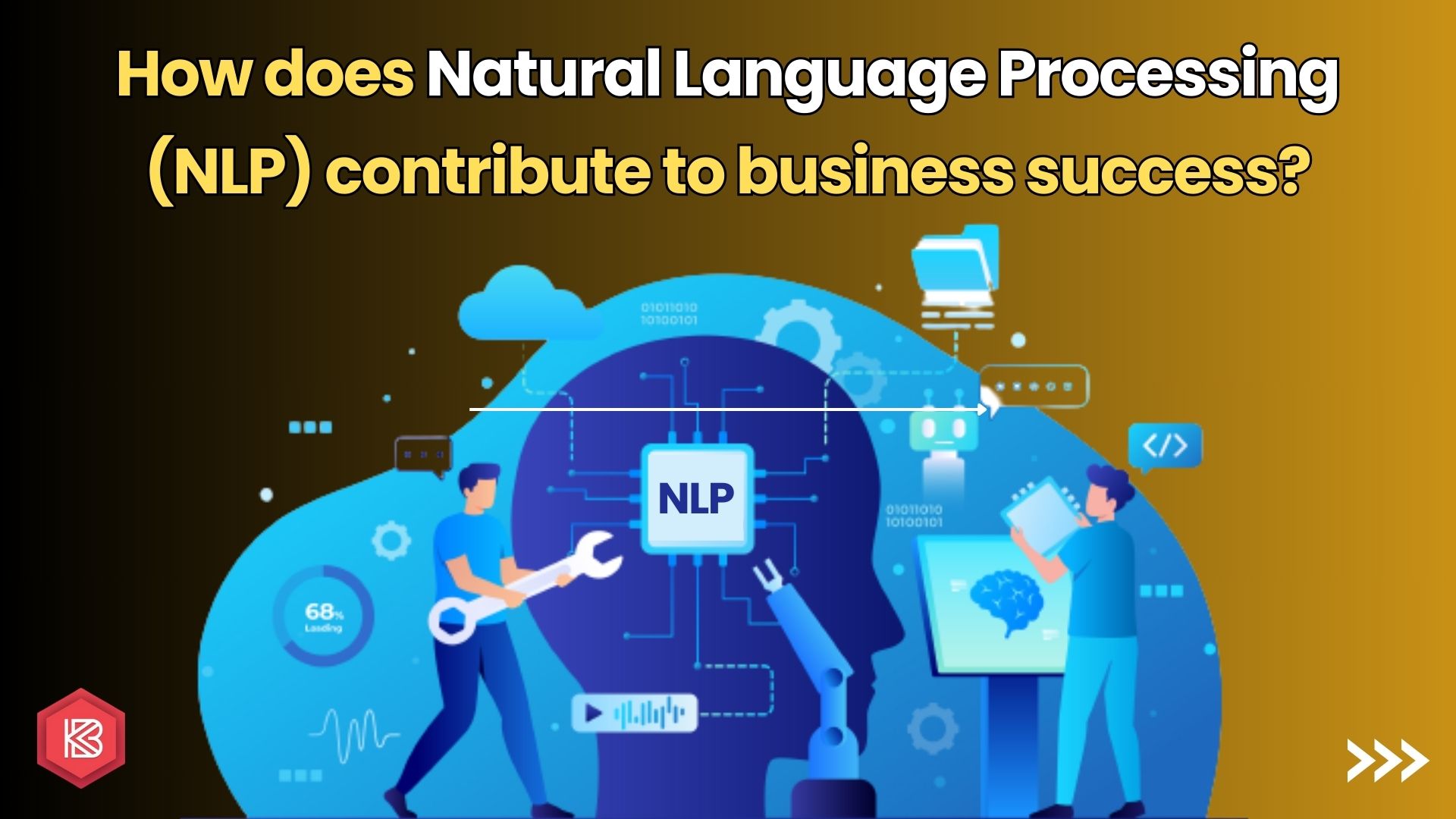How does Natural Language Processing (NLP) contribute to business success?

In today’s world, where information is crucial, businesses are always looking for smart ways to stay ahead. Natural Language Processing (NLP), a part of Artificial Intelligence (AI), is changing the game. It helps businesses unlock valuable information hidden in written words and makes it easier for them to understand and use text-based data. Companies all over the globe are starting to use AI and NLP more to work better and faster. With the help of technology, businesses can quickly and accurately learn about what their customers want and how they behave. NLP is becoming more and more important worldwide, and it’s predicted that its market will grow a lot, reaching $112.28 billion by 2030, with a fast growth rate of 24.6%.
What does ‘NLP’ mean in the business world?
In the business world, ‘NLP’ stands for ‘Natural Language Processing,’ which is a technology under the umbrella of artificial intelligence (AI). It’s all about teaching computers how to talk and understand human language in a way that’s helpful for business. This means machines can read, interpret, and even generate human language, which is super useful for things like analyzing text data or making chatbots for better customer service. In essence, NLP helps machines talk like us, and it’s a handy tool for businesses to make sense of written information.
Applications of Natural Language Processing (NLP) in Various Business Sectors:
Natural Language Processing (NLP) is incredibly versatile, finding applications across diverse industries. In sectors like customer support, marketing, finance, and healthcare, NLP powers chatbots, analyzes sentiment, and streamlines operations. Its adaptability makes NLP a valuable asset, improving efficiency and customer experiences across businesses.
Here are some common use cases of NLP in different sectors
Customer Support and Service:
Chatbots and Virtual Assistants: NLP powers chatbots and virtual assistants that can handle customer inquiries, resolve issues, and provide support 24/7.
Sentiment Analysis: NLP helps businesses analyze customer feedback, reviews, and social media comments to gauge customer sentiment and identify areas for improvement.
Marketing and Advertising:
Personalized Recommendations: NLP is used to analyze customer data and provide personalized product or content recommendations.
Social Media Analysis: NLP tools can monitor social media conversations and track brand mentions, helping businesses understand public perception and trends.
E-commerce:
Search and Navigation: NLP improves search capabilities on e-commerce websites, making it simpler for users to find products.
Product Review and Description Generation: Product reviews and descriptions can be generated using NLP, saving time and resources.
Finance:
Sentiment Analysis for Trading: Traders use NLP to analyze news articles and social media to gauge market sentiment.
Fraud Detection: NLP helps identify unusual patterns in textual data, aiding in fraud detection and prevention.
Healthcare:
Clinical Documentation: NLP is used to transcribe medical notes, convert speech to text, and fill electronic health records.
Disease Prediction: NLP analyzes patient records to predict disease outbreaks and identify health trends.
Legal:
Contract Analysis: To examine and extract important information from contracts and legal documents, law firms employ NLP.
Legal Research: NLP techniques assist lawyers in searching and analyzing huge amounts of legal content.
Human Resources:
Resume Screening: NLP automates the screening of resumes and job applications, matching candidates with job requirements.
Employee Feedback Analysis: NLP analyzes employee surveys and feedback to improve workplace satisfaction.
Retail:
Inventory Management: NLP assists in inventory management by analyzing supply chain data and demand forecasts.
Competitor Analysis: Retailers use NLP to gather insights on competitors’ pricing and strategies from online sources.
Top Benefits of Natural Language Processing (NLP) in Business:
Enhanced Customer Service and Support
One of the most prominent benefits of NLP in business is the transformation of customer service and support. AI-driven chatbots and virtual assistants, fueled by NLP, have emerged as game-changers in this arena. These digital agents can interact with customers in real-time, addressing queries, providing solutions, and guiding them through various processes. With these virtual assistants available 24/7, businesses ensure that customers receive assistance whenever they need it.
For instance, an e-commerce giant can implement an NLP-powered chatbot on its website, assisting customers with product inquiries, order tracking, and even facilitating returns. This not only lightens the load on human customer support agents but also offers rapid and efficient assistance to customers, enhancing overall satisfaction.
Personalized Customer Experiences
NLP empowers businesses to deliver highly personalized customer experiences. By analyzing customer data and interactions, NLP algorithms can tailor content, recommendations, and marketing messages to individual preferences. This level of personalization significantly improves customer engagement and satisfaction.
Imagine a streaming service leveraging NLP to analyze a user’s viewing history and preferences. Based on this data, the service can offer personalized movie and TV show recommendations, keeping users engaged and delighted.
Efficient Data Processing and Analysis
The modern business landscape inundates organizations with vast amounts of textual data daily. This includes emails, customer feedback, legal documents, and market research reports. NLP steps in to automate the extraction, summarization, and categorization of this data, saving valuable time and resources.
Consider a financial institution employing NLP to extract essential information from lengthy financial reports. This automation allows analysts to focus on critical insights and trends, bypassing the time-consuming data processing phase.
Sentiment Analysis and Market Insights
NLP is instrumental in sentiment analysis, helping businesses gauge public opinion and sentiment surrounding their products, services, or brands. By monitoring social media conversations, customer reviews, and online discussions, NLP provides valuable insights into market trends and customer preferences.
For instance, a restaurant chain can harness NLP to analyze customer reviews across various platforms. This analysis reveals which dishes receive the most love and uncovers areas for menu or service improvements.
Regulatory Compliance and Risk Management
In industries such as finance and healthcare, regulatory compliance and risk management are paramount. NLP plays a vital role in ensuring businesses stay compliant by analyzing and extracting crucial information from legal and regulatory documents, ensuring adherence to industry standards.
For example, an insurance company can deploy NLP to review insurance policies and identify any clauses that may pose risks or compliance issues, allowing them to take proactive measures to mitigate potential challenges.
Competitive Intelligence
NLP serves as a valuable asset for acquiring competitive insights. Companies can utilize NLP to examine text data from diverse sources like rival websites, industry news, and customer feedback. This keeps them well-informed about market shifts and competitor tactics.
For example, a tech firm could use NLP to track competitor-related news and reports, allowing them to stay at the forefront of industry trends, foresee their competitors’ actions, and adjust their strategies accordingly.
How do businesses apply NLP models?
We’ve witnessed how NLP contributes to the success of businesses, simplifying processes for both companies and their customers. This success is owed to the remarkable NLP models that underpin business expansion.
Now, let’s delve deeper into some of these NLP models that are gaining popularity across different industries:
Machine Translation: Have you tried an online translator? It feels like pure magic! NLP models, boosted by deep learning and machine learning, enable computers to grasp and translate human languages. But it’s not just about translating word by word; these models comprehend the entire meaning of sentences, including punctuation and grammar. A real-world example is eBay, which employs machine translation to facilitate seamless cross-border trade between buyers and sellers from diverse countries.
Virtual Assistants: You know those helpful virtual assistants like Siri or Alexa? They use NLP to understand what you say and respond like a real conversation. They’re pretty good at filtering out the background noise and focusing on what you want.
Text Analysis: There exist tools that aid businesses in the assessment of extensive text data. Some cater to professionals, while others assist in employee training, performance evaluation, or content generation. These tools employ a range of methods, such as data extraction, sentiment analysis, topic analysis, and named entity recognition. They assist businesses in comprehending customer trends, monitoring product performance, and even providing content suggestions.
Final Thoughts,
Natural Language Processing is not merely a technological advancement; it’s a transformative force driving business success across diverse sectors. Its ability to harness the power of textual data, extract meaningful insights, enhance customer experiences, and streamline operations makes it an invaluable tool in the AI toolkit.
As businesses continue to recognize the importance of NLP, they gain a competitive advantage by making data-driven decisions, improving customer interactions, and staying ahead of industry trends. In a world where data is king, NLP is the key to unlocking its full potential and achieving business excellence. Embracing NLP today is a strategic move that paves the way for a successful tomorrow in the ever-evolving landscape of AI and business.Discover the transformative potential of NLP for your business. Get in touch with Kryptobees, the industry-leading AI Development Company trusted by businesses worldwide. Let us empower your organization with cutting-edge natural language processing technology for enhanced efficiency and success.
 Discuss Project!
Discuss Project!
